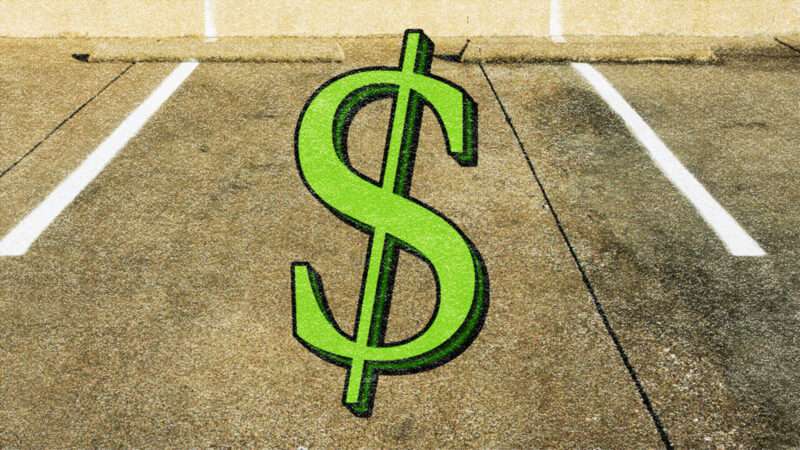
Seattle's criminal justice reforms inspired by 2020's George Floyd protests succeeded in abolishing one aspect of policing, if only accidentally. A bungled transfer of parking enforcement from the police department to its transportation department is forcing the city to waive some $5 million in parking tickets.
The shift of the city's parking enforcement unit from the Seattle Police Department (SPD) to the Seattle Department of Transportation (SDOT) got unanimous approval from the Seattle City Council in August 2021. It was part of the council's efforts to spin off more city functions out of SPD and into other departments.
But, as The Seattle Times reported last week, the transfer caused the city's parking enforcement personnel—who were never police officers—to lose the special commissions that empowered them to issue parking citations.
That oversight was corrected in April 2022, when Mayor Bruce Harrell ordered new commissions to be granted, reports the Times. But the city still had to forgive the 200,000 tickets issued during the prior seven months.
The slip-up, accidental and temporary though it was, is one of the more radical results of the city's policing reforms.
Following 2020's raucous protests and riots—where Seattle demonstrators forced the evacuation of one precinct building and established a self-governing, leftist street commune—the city council had considered far deeper cuts to the SPD budget.
Some council members endorsed activists' demands that the department's budget, then slightly over $400 million, be cut by 50 percent.
In the end, the city council cut SPD's budget by 11 percent on net. Spinning off functions from the police to nonpolice departments, including parking and 911 dispatchers, were responsible for a significant portion of those cuts.
The bureaucratic reshuffle of public safety and enforcement functions has gotten mixed reviews from criminal justice reformers at the time.
"Although these efforts to civilianize public safety and shrink the role of the police in our communities are a step in the right direction, it is not the same as what community has been calling for—police divestment and community reinvestment," wrote Mina Barahimi Martin, a policy analyst for the Washington American Civil Liberties Union, in a November 2021 blog post.
It advocated for shifting more money from public safety into housing, health care, and jobs programs.
One libertarian response to largely left-wing demands to defund the police in favor of other social spending was to instead privatize the provision of public safety. Nowhere would that be easier than parking.
Seattle, like many cities, provides a lot of on-street parking for free. Not charging for those spaces is troublesome from a free market perspective; taxpayers writ large are paying for parking spaces that a smaller subset of drivers use. The rent-free land provided is effectively a subsidy to those drivers.
And because prices aren't used to ration the space, people instead pay with their time by constantly circling the block looking for a place to park.
As a second-best solution to pricing free spaces, Seattle has a 72-hour rule that prohibits anyone from parking anywhere for more than 72 hours at a time. The rule is supposed to constantly redistribute space among drivers. But enforcing it obviously requires the employ of parking enforcement officers with the power to fine people for violating the rules.
Whether parking enforcement is conducted by the police department or the transportation department changes little about a system of government agents using fines to enforce a system of subsidies and forced rationing.
A better world is possible.
At a minimum, Seattle could expand its decade-old paid parking program—which charges a variable rate for parking spaces in higher-demand commercial areas—to the entire city.
Using prices to ration parking would shift the costs of parking from the public writ large onto individual drivers. It would also hopefully cut down on the need for city parking enforcement. Prices would encourage some people to park in off-street lots. Others could pay a market price for longer-term parking instead of gambling that they won't get a ticket for breaking the 72-hour rule.
The city's latest parking report for 2021 shows that even many priced parking areas have average occupancy rates well below the city's target rate of 70 percent to 85 percent.
That suggests parking is oversupplied and many existing public parking spaces could be sold off to adjacent property owners who could convert them into other uses or converted by the city instead into travel lanes for cars or bikes.
The former option would even earn the city money rather than costing it $5 million.
Indeed, the fact that property rights and prices can be assigned to parking spaces in the first place shows that parking isn't a public good that needs to be provided in public spaces by the government. Instead, it could all be privatized.
Without any public parking spaces, there would be no need for public parking enforcement. Private property owners would be responsible for charging for its use, controlling access, or converting it to nonparking uses.
That would do more to accomplish the goals of 2020's criminal justice reform protests than simply shifting parking cops from one department to another.
The post Seattle Accidentally Had To Forgive 200,000 Parking Tickets. It Should Have Privatized Parking Instead. appeared first on Reason.com.







